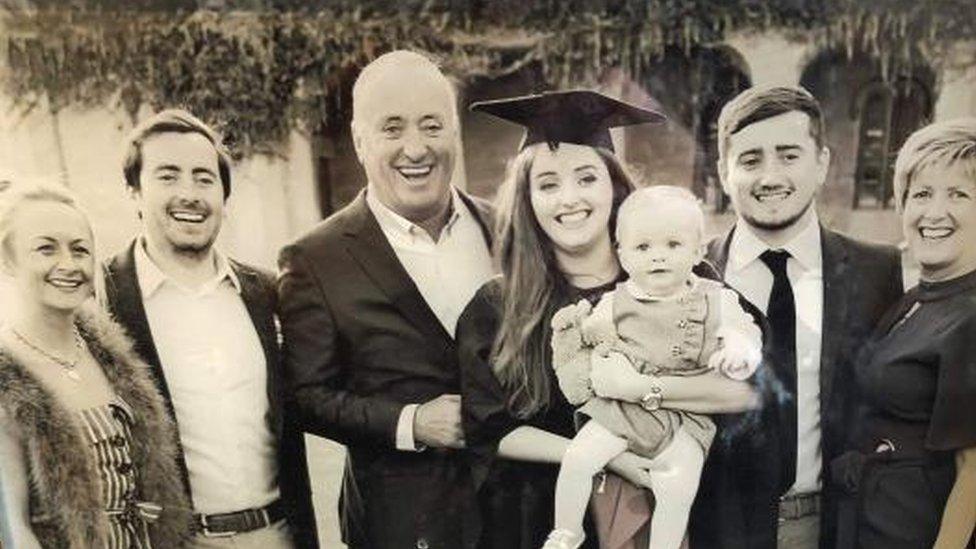Grace Millane murder: Mum confronts killer in court
- Published

Grace Millane, a University of Lincoln graduate, was murdered while travelling in New Zealand
The mother of a woman murdered in New Zealand has told her killer she thinks about "the terror and pain she must have experienced at your hand".
A 28-year-old man, who cannot be named for legal reasons, has been jailed for life for strangling Grace Millane while on a Tinder date in December 2018.
Her mother Gillian Millane told the killer "she died terrified and alone in your room".
The man was sentenced at Auckland High Court to a minimum of 17 years in jail.
Gillian Millane said her daughter "died terrified and alone"
Mrs Millane, speaking to the court via a video-link and next to a picture of her 21-year-old daughter, told the man she had wanted to take her own life because of the pain he had caused her.
She said: "Grace wasn't just my daughter. She was my friend. My very best friend.
"I am absolutely heartbroken that you have taken my daughter's future and robbed us of so many memories that we were going to create.
"The tears I shed are never-ending at the thought of never having the chance to kiss my Grace goodbye."
Her daughter's murderer held his head in his hands as he listened to the impact his "barbaric actions" have had on his victim's family.
Sentencing the man, Justice Simon Moore described the murderer's actions after the killing, including searching for pornography, as "conduct that underscores a lack of empathy and sense of self-entitlement and objectification".
He said: "You are a large and powerful man. She was diminutive. You were in a position of total physical dominance."
But he also stated the defence should not have been criticised on social media for pursuing a defence that Ms Millane had died during a consensual sex act as, even though the jury found this was not the case, this was the defendant's right.

From the courtroom
Simon Atkinson, BBC News, Auckland
Just before sentencing began, the Millanes tweaked the webcam that would beam their statements from an Essex living room.
There were smiles and small talk - like the sort of video calls families make across the globe. Then the mood changed.
First came Grace's sister-in-law, Victoria. Tearful as she told how her two-year-old daughter would never get to properly know her auntie Grace.
Then brother Declan. His mental health suffering. Part of his life taken away. But most of all devastated that he hadn't been able to protect his little sister.
And finally, mum Gillian.
The killer couldn't, or wouldn't, watch as she spoke.
"I want you to know I don't think of you," Mrs Millane told him. "Because if I did that means I care about you. And I simply don't."
"I will miss my darling Grace," she went on. "Until the last breath of my body leaves me."
And then silence.

The killer's lawyer argued he should be given a minimum term of 11 years as "rehabilitation and reintegration remains a real prospect".
However, the judge said he could not see how the defendant could serve any less than 17 years.

Ms Millane was last seen alive on the eve of her 22nd birthday
Ms Millane, from Wickford in Essex, met her killer on the dating app while travelling in Auckland.
The pair spent the evening drinking before returning to the man's room in the CityLife hotel in central Auckland where he killed her.
He then disposed of her body by burying it in a suitcase in the Waitākere Ranges, a mountainous area outside the city.
He was found guilty of murder last year.

Ms Millane's brother said she "had a smile to light up the room"
Ms Millane's brother Declan Millane told the court she "had a smile to light up the room".
He said: "As an older brother I felt a duty to protect my little sister. But there was nothing I could do. I was helpless and lost.
"There is no reason behind this unspeakable act."
Det Insp Scott Beard, who led the investigation into Ms Millane's murder, said Auckland City Police's thoughts were with her family.
"The impact of losing their daughter on her birthday while alone in a foreign country has been significant and no matter what the outcome they will forever have a life sentence," he said.
"Even though their lives have been changed forever we hope with support from family and friends they can now try in some way to move forward with their lives."
He added he did not believe "rough sex" should be considered a defence to murder as it "repetitively re-victimises the victim and the victim's family".
"Strangling someone for five to 10 minutes until they die is not rough sex," he said.
"In this case, the Millanes have had to sit through a trial for a number of weeks and their daughter's background, rightly or wrongly, was out in the public.
"I understand why the defence would use it but the bottom line is the individual has killed someone."

Why can we not name the killer?
The identity of Grace Millane's murderer cannot be disclosed because of a court order that bans media from naming and picturing him.
The purpose in New Zealand courts is to protect defendants before they are found guilty, but also to achieve a fair trial by ensuring the jury is not prejudiced by media coverage.
Images can also be withheld.
Justice Simon Moore ordered that the suppression order which prevents naming the defendant would stay in place indefinitely until lifted by the court.
The reasons for the order remaining in place are also suppressed.

Find BBC News: East of England on Facebook, external, Instagram, external and Twitter, external. If you have a story suggestion email eastofenglandnews@bbc.co.uk, external
- Published20 February 2020

- Published20 February 2020

- Published10 October 2019

- Published22 November 2019

- Published22 November 2019
